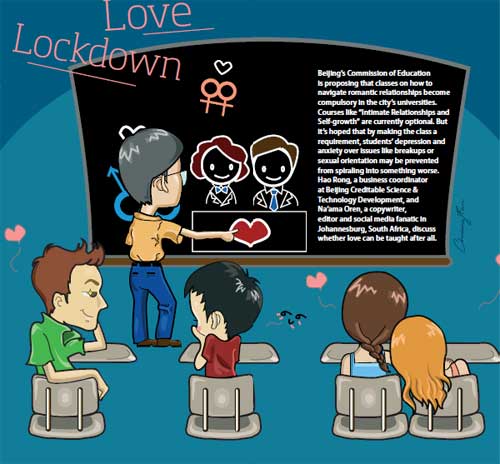|

Beijing's Commission of Education is proposing that classes on how to navigate romantic relationships become compulsory in the city's universities. Courses like "Intimate Relationships and Self-growth" are currently optional. But it's hoped that by making the class a requirement, students' depression and anxiety over issues like breakups or sexual orientation may be prevented from spiraling into something worse. Hao Rong, a business coordinator at Beijing Creditable Science & Technology Development, and Na'ama Oren, a copywriter, editor and social media fanatic in Johannesburg, South Africa, discuss whether love can be taught after all.
Making Decisions
by Hao Rong
When I was a senior in university, I did an internship at an international food chain company. It was my first job, and I was always afraid of doing something wrong. I was shy to communicate with others, and sometimes scolded by my boss for being inexperienced and passive. It was at that time that Lin appeared. He was the very helpful and always encouraging assistant manager. All the staff liked him.
Lin was also kind to me, helped me deal with tough customers, and took responsibility when I had done something wrong. We became very close. However, our closeness only lasted four months and ended with the completion of my internship.
Looking back at the breakup, many differences existed between us and we had different ways of dealing with people. I dislike being too tied to a man with no independence of my own, and slowly found Lin was not my style. Because I was leaving for Beijing for school, I decided to break up with him.
I've almost forgotten my feelings from that period. I know many girls suffer through breakups and some even commit suicide. As a young girl I also felt sad and confused, but I did not feel so bad. But I was a senior, and could make a decision in a reasonable way.
In talking about lessening the negative effects of failed love, many universities have set up psychotherapy services to help students struggling with their studies, emotions and life in general. I believe that it's better to find a reliable friend or teacher to talk to.
Speaking out purges negative feelings. In my experience, I was able to get over my breakup quickly because I turned to my most reliable friend for help. Her advice was invaluable. And looking back I feel grateful the experience taught me how to love and gain maturity. In this respect, a course on how to navigate romantic relationships is necessary, as it can help students to find a way to survive their emotional hurt.
It has been four years since I graduated. I would tell my younger self as well as today's university students: when looking for a boyfriend or a girlfriend, please look at the person as a whole, don't just focus on their looks. Be tolerant and show affection to your loved one. If you find him or her not suitable, then say goodbye decisively in a proper way.
Running Wild
by Na'ama Oren
I'm a 30-something singleton living in a big city. Luckily, I'm at an age where relationships are not at the forefront of my mind. But even 10 years ago, I lacked that emotional maturity. When you're a teenager, or in your twenties, it can sometimes be difficult to be objective in relationships. Your hormones are running wild; you're trying to deal with your first few years of adulthood and on top that, there is constant pressure to fit into a particular group, and to have a partner who does too.
One of my first relationships encompassed my whole first year of university. Though we started out well, within a month of dating, we were at each other's throats. We were fighting so often that by the time we hit three months, we decided we couldn't take the fighting anymore, and we broke up.
Despite the fact that we were obviously not compatible, we decided to give it another go. Somewhere around the nine-month mark, we broke up for real. The reason? I provoked one of the biggest fights we had ever had, and then refused to admit guilt. I felt like the injured party, the victim of someone else's terrible temper. But in hindsight, I've realized that what I did back then was my attempt to pull the plug on the relationship. And my subsequent feelings of sadness were a deserved punishment for my actions.
At 18 I had no emotional knowledge. What I needed at that age was some kind of guideline, an objective to work toward. This of course sparks the question: would it have helped if I had taken a love class?
In Beijing, commissioners of education are currently debating the same issue. Can a love/sex class help teenagers overcome issues such as depression, despondency and the confusion that comes with trying to understand relationships?
My 18-year-old self says, "Probably not." I'm not saying some kind of guidance wouldn't have been helpful, but I don't know that a "class" in the traditional sense would have helped me. At that age, I felt like I knew everything, and probably wouldn't have taken advice from someone older and more experienced. What may have helped at that age would be a peer, someone who was in the same place as me, and saw the world in the same way I was seeing it.
So what does my 30-something self have to say to 18-year-old me? Chill out. Failed relationships can be blamed on many things: lack of education, parents who were inadequate role models, personal feelings of inadequacy. However, it doesn't help to dwell on what went wrong. One experience shouldn't define who you are. |